Eyes in the Night

Brief Synopsis
Cast & Crew
Fred Zinnemann
Edward Arnold
Ann Harding
Donna Reed
Horace Mcnally
Katherine Emery
Film Details
Technical Specs

Synopsis
New York detective Duncan Maclain refuses to allow blindness to interfere with his work, which is aided by his faithful dog Friday, his butler, Alistair, and his assistant, Marty. One day, actress Norma Lawry, an old friend, visits Mac and asks him to help her prevent her stepdaughter Barbara from doing something foolish with actor Paul Gerente. Paul, a cad who had once been Norma's lover, has convinced Barbara that Norma only married her father Stephen for his money. Mac tells Norma that she doesn't need a "gumshoe" and suggests that she talk to Paul herself. Paul refuses to listen to Norma's pleas and insists that he loves Barbara, who is appearing in a local theatrical production with him, even though she is only seventeen. That night, Stephen has to go away on a business trip to test a secret formula on which he has been working for the government. Because Norma is worried about Barbara, she decides not to accompany him and goes to Paul's apartment. When Barbara arrives, she finds Paul's dead body and thinks that Norma has killed him, even though Norma insists that he was dead when she arrived. Barbara, who hates Norma, threatens to call the police unless she leaves Stephen. Fearing that a scandal will hurt him, Norma agrees. Norma then turns to Mac, who goes to Paul's apartment, but finds the body missing. While he is searching for clues, a man arrives, telephones Norma's number and talks to someone. Mac and Friday are able to overcome the man by extinguishing the lights, and although Mac learns the man's identity, Gabriel Hoffman, Gabriel reveals nothing more and Mac has Marty hide him. Mac then goes to Norma's house in the country and pretends to be an uncle who has come for a visit. Shortly thereafter, Barbara comes home from her rehearsal, accompanied by her director, Cheli Scott, whom she has invited to spend the night. Unknown to Barbara and Norma, Cheli is a Nazi agent who is working with Hansen, the Lawry's butler, to steal the plans to Stephen's invention. Cheli ordered Paul killed because his affection for Barbara was beginning to limit his effectiveness as a spy. Gabriel and his wife Vera, who is a maid at the house, are also working with Cheli, and when Gabriel does not return home after his "assignment," Vera becomes hysterical with worry. Mac, whose pretense of being a demanding old curmudgeon has distracted Hansen, secretly asks Vera to meet him in the greenhouse. She is observed by her cohorts, however, and is killed before she can reach Mac. The spies then cut the house's telephone wires so that Mac and Norma cannot reach the police, but Mac slips a note into Friday's collar and tells him to "go home." While Friday runs to Mac's, Stephen arrives home, and Cheli threatens his family if he does not give her the entire formula. Mac tries to stall for time, but is taken to the cellar, where his advantage of having "eyes" in the dark, helps him to overcome his captor. Just then the police and Marty arrive, having been summoned by Friday's note. Finally, Barbara realizes how much Norma cares for her, and the Lawrys become a happy family.

Director

Fred Zinnemann
Cast

Edward Arnold

Ann Harding
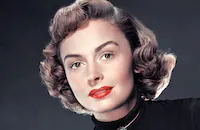
Donna Reed

Horace Mcnally

Katherine Emery

Allen Jenkins

Stanley C. Ridges
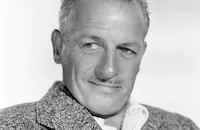
Reginald Denny
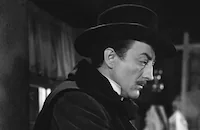
John Emery

Rosemary De Camp
Erik Rolf

Barry Nelson
Reginald Sheffield

Steve Geray

Mantan Moreland
Friday
Ivan Miller
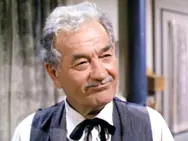
Milburn Stone
Edward Kilroy
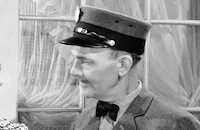
John Butler
William Nye
Frank M. Thomas
Fred Walburn
Robert Winkler
Walter Tetley
Cliff Danielson

Frances Rafferty
Crew
Virgil Apger
Edward J. Boyle
Jack Chertok
Cedric Gibbons
Lennie Hayton
Charles Hunt
Kalloch
Charles Lawton
Robert Planck
Howard Emmett Rogers
Stan Rogers
Bert Spurlin
William Steuer
Guy Trosper
Edwin B. Willis
Ralph Winters

Videos
Movie Clip



Trailer
Film Details
Technical Specs

Articles
Eyes in the Night
A veteran from MGM's shorts department, Zinnemann cut his teeth during the reign of Louis B. Mayer who came to regard the fledgling director and fellow newcomers Jules Dassin and George Sidney as "his boys" (Fred Zinnemann: An Autobiography). The chance to direct features led to a double-punch of thrillers, both with strong casts composed of name actors. However, Zinnemann had little interest in Eyes in the Night, recalling, "I didn't like it much and remember very little about it. I hated the script but liked the writer, Guy Trosper, who also hated the script. The only pleasures were working with the marvelous Ann Harding and with Donna Reed, who was delicate and charming." However, not all of the performers were harmonious - including the human and canine leads. Arnold "couldn't remember his lines and kept blowing take after take; the dog was good for only one take, would then get bored, run away and hide...All this was most useful training for future occasions." Briskly shooting the film in four weeks, Zinnemann nevertheless delivered a crisp, tight, engaging nail-biter, successful enough for Arnold's blind lead character (taken from the much-changed source novel, Baynard Kendrick's The Odor of Violets), to return in a non-Zinnemann 1945 follow-up, The Hidden Eye.
The film also marked a successful comeback for Harding, an established actress in films like Enchanted April and Peter Ibbsetson (both 1935), who left the screen in 1937 to focus on her marriage to conductor Werner Janssen. Unable to resist a return to acting, she continued to work in such studio projects as The Man in the Grey Flannel Suit before retiring permanently in 1956. By contrast, the young Donna Reed had only been in the business for one year, earning supporting roles in MGM's "Andy Hardy" and "Thin Man" franchises but still three years away from her big break in 1945 with The Picture of Dorian Gray and, most famously, It's a Wonderful Life (1946). Unfortunately, the uncooperative dog, Friday (son of silent canine star Flash), failed to earn any more roles after appearing in the next Duncan Maclain mystery.
As for Zinnemann, he continued his tenure at MGM through 1948 and then went independent with Stanley Kramer Productions, a four-picture partnership highlighted by the legendary western High Noon in 1952. The following decade yielded his best work, including such classics as From Here to Eternity (1953), Oklahoma! (1955), The Member of the Wedding (1952), A Hatful of Rain (1957), and The Nun's Story (1959). Though never embraced as a great auteur, Zinnemann consistently displayed an assurance of his craft that made him a reliable helmer, capable of leaping from small, atmospheric works-for-hire like Eyes in the Night to sprawling, all-star epics with the best of them.
Producer: Jack Chertok
Director: Fred Zinnemann
Screenplay: Guy Trosper, Howard Emmett Rogers, Baynard Kendrick (book)
Cinematography: Charles Lawton, Jr., Robert Planck
Film Editing: Ralph Winters
Art Direction: Cedric Gibbons
Music: Lennie Hayton
Cast: Edward Arnold (Duncan Maclain), Ann Harding (Norma Lawry), Donna Reed (Barbara Lawry), Stephen McNally (Gabriel Hoffman), Katherine Emery (Cheli Scott), Allen Jenkins (Marty).
BW-80m.
by Nathaniel Thompson

Eyes in the Night
Quotes
I'm off to the Harlem Squash and Tennis Club to meet my dream girl.- Alistar
Why, you wolf!- Alistar
Trivia
Notes
Working titles of the film were Odor of Violets and Strange Shadows. A Hollywood Reporter news item on May 13, 1942 noted that M-G-M was seeking Henry Wilcoxon for the cast, but he did not appear in the released film. News items also include Tom Murray, William Bailey and Hal Le Sueur in the cast, but their appearance in the film has not been confirmed. According to a Hollywood Reporter news item on July 10, 1941, screenwriter Howard Emmett Rogers was working with Peter Ruric on the script. Ruric is not credited in other sources and the extent of his contribution to the released film has not been determined. A Hollywood Reporter news item on October 12, 1942 noted that "Friday" was making an extensive personal appearance tour with his trainer, William Steuer, that was designed to focus attention on the government's need for more dogs in war work.
Eyes in the Night was Ann Harding's first film since Love from a Stranger, a 1937 British-U.S. co-production produced in 1937 (see AFI Catalog of Feature Films, 1931-40; F3.5389). The character "Duncan Maclain" was revived for a 1945 M-G-M film entitled The Hidden Eye, also starring Edward Arnold and "Friday" as his dog and based on a Baynard Kendrick novel. Frances Rafferty, who has a minor role in Eyes in the Night, was the second lead in the 1945 picture.















